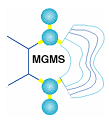The Open Free Energy Consortium: Alchemistry for Everyone
Richard J Gowers1, Benjamin Ries1,2, Irfan Alibay1, David W. H. Swenson1 and Michael M. Henry1,3
1The Open Free Energy Consortium, Open Molecular Software Foundation, Davis, California 95616, United States
2Boehringer Ingelheim Pharma GmbH & Co KG, Medicinal Chemistry, Birkendorfer Str 65, 88397 Biberach an der Riss, Germany
3Computational and Systems Biology Program, Sloan Kettering Institute, Memorial Sloan Kettering Cancer Center, New York, NY, USA
Alchemical free energy methods have found tremendous success over the last few decades, becoming key components of drug discovery pipelines. Despite many and ongoing innovations in this area, with several methodological improvements published each year, it remains challenging to consistently run free energy campaigns using state-of-the-art tools and best practices. In many cases, doing so requires expert knowledge, and/or the use of expensive closed source software. The Open Free Energy Consortium (https://openfree.energy/) was created with the aim of addressing these issues. A joint effort between academic and industry partners, the consortium aims to create and maintain reproducible and extensible open source toolkits for running large scale free energy campaigns. The initial flagship product of the Open Free Energy Consortium is the OpenFE toolkit (https://github.com/OpenFreeEnergy/openfe/), a permissively licensed open-source Python framework to setup, calculate, and analyse relative binding free energies.
In this contribution we will summarise the progress and outputs of the project after its first year of operation. First we present the first benchmark results of the OpenFE toolkit. We compare the accuracy of ΔΔG estimates for approximately 200 ligand transformations calculated using the OpenFE toolkit with the OpenMM molecular dynamics engine, against previously published benchmark systems. We also assess the relative compute performance and accuracy of various equilibrium and non-equilibrium methods, including Hamiltonian replica exchange, self-adjusted mixture sampling, and non-equilibrium switching. Finally, we detail next steps for the toolkit, including the addition of support for other molecular dynamics engines, absolute binding free energies, and the ongoing curation of protein-ligand free energy benchmarks.


